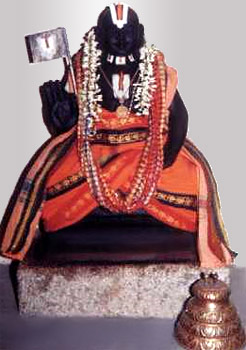 Yamunacharya, also known as Alavandar, was a vishistadvaita philosopher at Srirangam. Ramanuja, the disciple of Yamunacharya, was a leader of the Srivaishnava School. Yamunacharya was born in earlier parts of the tenth century CE and he was the grandson of a Brahmin called Nathamuni. His grandfather was a famous yogi who collected the Tamil alvars` works. Yamunacharya grew up learning Vedic texts from Rama Misra, who was also called Manakkal Nambi and he was an expert in mimansa. The responsibility of Vaishnava leadership fell by common opinion on the shoulders of Yamunacharya, who was a married and was leading a householder`s life. He lived during the period of the early famous Cholas and the period witnessed a great religious ferment, and its outward exhibition in India came out as a controversial activity.
Yamunacharya, also known as Alavandar, was a vishistadvaita philosopher at Srirangam. Ramanuja, the disciple of Yamunacharya, was a leader of the Srivaishnava School. Yamunacharya was born in earlier parts of the tenth century CE and he was the grandson of a Brahmin called Nathamuni. His grandfather was a famous yogi who collected the Tamil alvars` works. Yamunacharya grew up learning Vedic texts from Rama Misra, who was also called Manakkal Nambi and he was an expert in mimansa. The responsibility of Vaishnava leadership fell by common opinion on the shoulders of Yamunacharya, who was a married and was leading a householder`s life. He lived during the period of the early famous Cholas and the period witnessed a great religious ferment, and its outward exhibition in India came out as a controversial activity.
Yamunacharya attained a prominent status due to a successful controversy which he held against a Saiva called Akkiyalvan. Yamunacharya was a famous dialectician and thus he achieved success as a result of a clever stroke. His opponent, Akkiyalvan, look too foolishly for he undertook to demonstrate the contrary of everything what ever was told by Yamuna. Yamunacharya turned the tables on Akkiyalvan by his three statements. The three statements were that Akkiyalvan`s mother was not barren, the King who ruled over the country was righteous and the queen sitting beside the king was chaste. Yamunacharya overcame Akkiyalvan with the help of recognized rules of logic that the mother of Akkiyalvan was barren, the king who ruled the country was not righteous and the queen sitting beside the king was unchaste. The queen and the king got impressed by the argument of the boy and understood that the boy knew very well the drawbacks of logic, and thus they adopted him. According to another legend, Yamunacharya was provided with half of the kingdom.
After some years of rule, Yamunacharya was tricked by Mannakal Nambi to visit the temple of Ranganatha. There, Yamunacharya attained a divine manifestation and renounced all his material duties including that of a king and embraced saranagati and became a sanyasin. Yamunacharya composed the Strotra Ratna and the chatushloki at that spot. Yamunacharya was given the charge of Natha Muni`s school which also includes the collected Divya Prabandha by Mannakal Nambi and was renamed Yamuna Muni or Yamunacharya. When he grew old, he was disturbed by the thought that he was unable to complete the tasks set by him and thus asked for the visit of Ramanuja. However, he died before talking to Ramanuja. The Srivaishnavite devotees believe that the corpse of Yamunacharya was seen with three curled fingers by Ramanuja and he became aware of the task and became determined to complete them at the point when the fingers straightened. Like Ramanuja, Alavandar or Yamunacharya concentrated on the debates of philosophy including Dvaita philosophy verses Advaita, Bhakti prayers and his works are in Sanskrit language. Some of the great works which are attributed to Yamunacharya include Chathusloki, a famous prayer devoted to Goddess Lakshmi, Stotra Ratnam, a prayer devoted to Narayana, etc.









